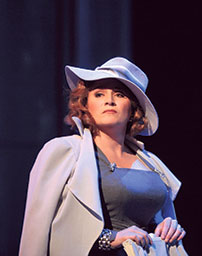“Coincidence is a pimp and a cardsharper in ordinary fiction but a marvelous artist in the patterns of facts recollected by a non-ordinary memorist.”
Vladimir Nabokov, Look at the Harlequins!
Archives for 2009
TT: Absent with leave
I’m taking a week off from my Wall Street Journal drama column in order to recuperate from the premiere of The Letter. This is the first time I’ve skipped a column since I nearly died in 2005. I think I’ve earned a little holiday, don’t you?
See you next week.
TT: Almanac
“A comedy is just a tragedy interrupted, I once said. Do you finish with the kiss or when she opens her eyes to tell him she loves him and sees blonde hairs on his collar?”
Alan Ayckbourn, “A Crash Course in Playwriting”
TT: Blowin’ in the wind
 As the house lights went down just before nine o’clock last night in preparation for the second performance of The Letter, lightning crackled in the distance and dark clouds scudded across the moon that shone down on Santa Fe. Paul Moravec pointed up and said, “Look–it’s just like the first scene of the movie!” And sure enough, it was.
As the house lights went down just before nine o’clock last night in preparation for the second performance of The Letter, lightning crackled in the distance and dark clouds scudded across the moon that shone down on Santa Fe. Paul Moravec pointed up and said, “Look–it’s just like the first scene of the movie!” And sure enough, it was.
Gorgeously theatrical-looking bolts of lightning split the sky throughout the first four scenes of the opera, but nary an unintended sound was heard in the open-air theater until the moment in the sixth scene when Mika Shigematsu handed the fatal letter to Rodell Rosel. “This is the correct document, sir,” Rodell sang to Jim Maddalena. Then an ominous peal of thunder rolled over the mesa. I could almost hear the packed house shuddering. Nature is the best designer, I thought, hugging myself with delight.
 Nature got a bit out of hand in the last scene. A gusty wind blew through the theater, knocking several plates and wine glasses off the dinner table at center stage just before Pat Racette started singing her big aria. I was briefly afraid that it would upstage her, but I should have known better. Instead of being intimidated by the wind, Pat used it, striding across the stage with utter self-confidence, and received a well-deserved round of applause for having risen so fearlessly to the occasion.
Nature got a bit out of hand in the last scene. A gusty wind blew through the theater, knocking several plates and wine glasses off the dinner table at center stage just before Pat Racette started singing her big aria. I was briefly afraid that it would upstage her, but I should have known better. Instead of being intimidated by the wind, Pat used it, striding across the stage with utter self-confidence, and received a well-deserved round of applause for having risen so fearlessly to the occasion.
Alas, the wind kept on blowing, and when I saw the ground cloth billowing beneath the singers’ feet, I felt sure that Patrick Summers, the conductor, would have to stop the show. But everyone kept their heads, and the opera continued all the way to the final blackout without further incident. Paul and I had been asked to take a curtain call, and we burst through the stage door just in time to see the members of the cast laughing as they waited in the wings to take their bows. “You are the greatest trouper who ever lived!” I told Pat.
If you read what I wrote in this space after the opening-night performance of The Letter, you’ll recall that I was unable to hear the applause from the wings on Saturday, nor could I see the audience when Paul and I went on stage for our curtain call. Not so last night! I had no trouble hearing the reassuring sounds of clapping and cheers and seeing the happy people in the first few rows of seats, not to mention the musicians in the pit, all of whom were grinning broadly. By then we were feeling pretty loose, and when Paul and I stepped back from the lip of the stage to join the cast for a group call, I said the only thing possible under the circumstances: “Well, we blew ’em away!” Everyone in the company was hooting as we trotted into the wings. No sooner did I catch sight of Duane Schuler and Paul Horpedahl, the lighting designer and head of production, than I fixed them both with a steely gaze and said, “O.K., guys–keep the lightning, kill the wind!”
So what was it like to watch the rest of the second performance of The Letter? On the whole, I had a lot more fun. Until the wind started blowing, I wasn’t nervous at all, and it felt this time as though I were seeing a show that I’d written. The audience laughed in all the right places and fell silent on cue, an indication that the opera was working the way it was intended to work. The only difference was that on Wednesday, we got applause during the show, after each of the three main arias and (much to Paul’s and my surprise) immediately following the central flashback. Mrs. T told me that the ovation at the end was, if anything, even more fervent than on Saturday.
I’ll be in town until Tuesday, long enough to see the third performance on Monday night, but the pressure is off. It seems clear–gratifyingly, gloriously clear–that Paul and I have succeeded in writing a modern opera that goes over with audiences in a big way, which is what we set out to do. From here on, I’m going to sit back and enjoy myself. Whatever lies in store for The Letter is out of my hands. For now, it’s time to bask in the applause and revel in the moment.
TT: So you want to see a show?
Here’s my list of recommended Broadway, off-Broadway, and out-of-town shows, updated weekly. In all cases, I gave these shows favorable reviews (if sometimes qualifiedly so) in The Wall Street Journal when they opened. For more information, click on the title.
Warning: Broadway shows marked with an asterisk were sold out, or nearly so, last week.
BROADWAY:
• Alfred Hitchcock’s The 39 Steps (comedy, G, suitable for bright children, reviewed here)
• Avenue Q * (musical, R, adult subject matter and one show-stopping scene of puppet-on-puppet sex, closes Sept. 13, reviewed here)
• The Little Mermaid * (musical, G, entirely suitable for children, closes Aug. 30, reviewed here)
• South Pacific * (musical, G/PG-13, some sexual content, brilliantly staged but unsuitable for viewers acutely allergic to preachiness, reviewed here)
OFF BROADWAY:
• The Fantasticks (musical, G, suitable for children capable of enjoying a love story, reviewed here)
• Our Town (drama, G, suitable for mature children, reviewed here)
• Ruined (drama, PG-13/R, sexual content and suggestions of extreme violence, closes Sept. 6, reviewed here)
IN ASHLAND, OREGON:
• The Music Man (musical, G, very child-friendly, closes Nov. 1, reviewed here)
IN CHICAGO:
• The History Boys (drama, PG-13/R, adult subject matter, too intellectually complex for most adolescents, closes Sept. 27, reviewed here)
IN GARRISON, N.Y.:
• Pericles and Much Ado About Nothing (Shakespeare, PG-13, playing in repertory through Sept. 6, reviewed here)
CLOSING SOON ON BROADWAY:
• Mary Stuart (drama, G, far too long and complicated for children, closes Aug. 16, reviewed here)
CLOSING SUNDAY IN CHICAGO:
• A Minister’s Wife (musical, PG-13, reviewed here)
TT: Almanac
“I am not suggesting that witnessing a spate of appallingly bad plays is a creditable method of learning how to write a good one, but it has its points. Though I had no idea whatever of writing plays at that time–the thought never crossed my mind–I am certain that some of those expository first acts, some of the ineptitudes of those second-act climaxes, and some of the stunning lack of invention in those third acts must somehow have seeped into my inner consciousness. The big ‘hit’ of any season always seems absurdly simple; so effortlessly does it unfold, that it almost seems as though it could not have been written any other way. Watch a failure on the same subject, and you will see by what a slim margin the mistakes have been by-passed, the cul-de-sacs averted in the hit.”
Moss Hart, Act One
TT: Tune me in
If you live within range of KSFR, Santa Fe’s public radio station, I’ll be talking about jazz–and, more than likely, about The Letter–on “Good Morning Jazz,” John Greenspan’s Wednesday-morning jazz program, which airs from nine a.m. to noon MT (that’s eleven a.m. to two p.m. ET). Tune your radio to 101.1 FM, or go here to listen on the Web via streaming audio.
I’m about to head into the studio, so tune in now!
TT: Snapshot
Billie Holiday sings “Fine and Mellow” on The Sound of Jazz, originally telecast on CBS in 1957. The soloists (in order) are Ben Webster on tenor saxophone, Lester Young on tenor saxophone, Vic Dickenson on trombone, Gerry Mulligan on baritone saxophone, Coleman Hawkins on tenor saxophone, and Roy Eldridge on trumpet:
(This is the latest in a weekly series of arts-related videos that appear in this space each Wednesday.)
